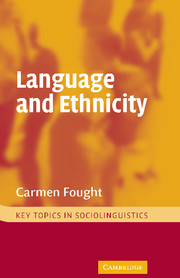Book contents
- Frontmatter
- Contents
- Preface
- Acknowledgments
- Part I General issues in ethnicity and language
- Part II Linguistic features and ethnicity in specific groups
- 3 African-American groups
- 4 Latino groups
- 5 Linguistic variation in other multiethnic settings
- 6 Are white people ethnic? Whiteness, dominance, and ethnicity
- 7 Dialect contact, ethnicity, and language change
- Part III The role of language use in ethnicity
- Notes
- Glossary of terms
- References
- Index
- References
3 - African-American groups
Published online by Cambridge University Press: 05 September 2012
- Frontmatter
- Contents
- Preface
- Acknowledgments
- Part I General issues in ethnicity and language
- Part II Linguistic features and ethnicity in specific groups
- 3 African-American groups
- 4 Latino groups
- 5 Linguistic variation in other multiethnic settings
- 6 Are white people ethnic? Whiteness, dominance, and ethnicity
- 7 Dialect contact, ethnicity, and language change
- Part III The role of language use in ethnicity
- Notes
- Glossary of terms
- References
- Index
- References
Summary
Suburban America or upward America is not my audience. My audience is mostly grassroots people. And I sound mostly like they uncle, so … See like, I said, “I sound mostly like they uncle.” And I was cool with that. That sound good to me.
(Steve Harvey, African-American talk show host from PBS documentary Do You Speak American?, 2005)African American Vernacular English. AAVE. Black English. Ebonics. African-American English. African-American Language. Spoken Soul. Whatever name we give to this variety, it stands at the center of so much that is crucial in sociolinguistics, and in the study of language and ethnicity specifically. It is one of the most studied dialects in the world. It is at the heart of a long-standing and often heated controversy in the field, over where it came from originally. It is a political hot potato in the public arena, a topic capable of flinging otherwise peaceful and private linguists into the center of a national spotlight during the debate over the Oakland Resolution. And it is the context for one of the best chances American linguists have to give something back to the society in which they live, both by providing tools for the teaching of standard dialects to AAVE speakers and by raising the level of awareness of the beauty and complexity of AAVE so that its speakers won't continue to be maligned by teachers and employers.
- Type
- Chapter
- Information
- Language and Ethnicity , pp. 45 - 69Publisher: Cambridge University PressPrint publication year: 2006

